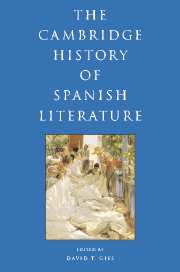Book contents
- Frontmatter
- I INTRODUCTION
- II HISTORY AND CANONICITY
- III THE MEDIEVAL PERIOD
- IV EARLY MODERN SPAIN: RENAISSANCE AND BAROQUE
- 7 Renaissance and Baroque: continuity and transformation in early modern Spain
- 8 Religious literature in early modern Spain
- 9 Renaissance poetry
- 10 The antecedents of the novel in sixteenth-century Spain
- 11 Miguel de Cervantes
- 12 The making of Baroque poetry
- 13 The development of national theatre
- 14 Lope Félix de Vega Carpio
- 15 Pedro Calderón de la Barca
- 16 Didactic prose, history, politics, life writing, convent writing, Crónicas de Indias
- V THE ENLIGHTENMENT AND NEOCLASSICISM
- VI THE FORGING OF A NATION: THE NINETEENTH CENTURY
- VII THE MODERN, MODERNISMO, AND THE TURN OF THE CENTURY
- VIII TWENTIETH-CENTURY SPAIN AND THE CIVIL WAR
- IX IN AND OUT OF FRANCO SPAIN
- X POST-FRANCO SPANISH LITERATURE AND FILM
- Bibliography
- Index
10 - The antecedents of the novel in sixteenth-century Spain
from IV - EARLY MODERN SPAIN: RENAISSANCE AND BAROQUE
Published online by Cambridge University Press: 28 March 2008
- Frontmatter
- I INTRODUCTION
- II HISTORY AND CANONICITY
- III THE MEDIEVAL PERIOD
- IV EARLY MODERN SPAIN: RENAISSANCE AND BAROQUE
- 7 Renaissance and Baroque: continuity and transformation in early modern Spain
- 8 Religious literature in early modern Spain
- 9 Renaissance poetry
- 10 The antecedents of the novel in sixteenth-century Spain
- 11 Miguel de Cervantes
- 12 The making of Baroque poetry
- 13 The development of national theatre
- 14 Lope Félix de Vega Carpio
- 15 Pedro Calderón de la Barca
- 16 Didactic prose, history, politics, life writing, convent writing, Crónicas de Indias
- V THE ENLIGHTENMENT AND NEOCLASSICISM
- VI THE FORGING OF A NATION: THE NINETEENTH CENTURY
- VII THE MODERN, MODERNISMO, AND THE TURN OF THE CENTURY
- VIII TWENTIETH-CENTURY SPAIN AND THE CIVIL WAR
- IX IN AND OUT OF FRANCO SPAIN
- X POST-FRANCO SPANISH LITERATURE AND FILM
- Bibliography
- Index
Summary
The rise of narrative prose fiction in sixteenth-century Spain is an intricate process that is difficult to synthesize. In a vast universe of texts, it cannot be reduced to a clean outline or progression. Many types of fiction appeared, infiltrated and mutually influenced each other, and extended their individual and collective vitality well beyond the moment of their origins to affect later, newly emerging kinds of narrative. Any history of prose fiction of the period must therefore be constructed by force of generalization and at the expense of detail and objectivity. Two things remain clear, however: the sheer profusion of styles that appeared and the absence of any single controlling tendency, or commanding genre, that eclipsed all others. Five kinds of prose narrative stand out and serve as necessary antecedents for understanding Cervantes and the development of the novel in the early seventeenth century. These are the chivalric, pastoral, Moorish, Byzantine, and picaresque romances, which constituted the core genres, if that is what they may be called, that developed out of a broad and varied process of narrative invention and reciprocal influence in early modern Spain. Put simply, the Iberian peninsula during the sixteenth century can be seen as a vast laboratory for literary experimentation and innovation where the writing of imaginative prose remained a serious and persistent cultural activity. Literary historians have in large part, however, dismissed much of what was produced during this period, banishing it to the footnotes of cultural history, while, with perhaps the exception of Lazarillo de Tormes, privileging lyric genres and characterizing the developments in sixteenth-century narrative prose as the necessary but flawed precursors of a later group of mature, transcendent works and forms.
- Type
- Chapter
- Information
- The Cambridge History of Spanish Literature , pp. 178 - 200Publisher: Cambridge University PressPrint publication year: 2005



